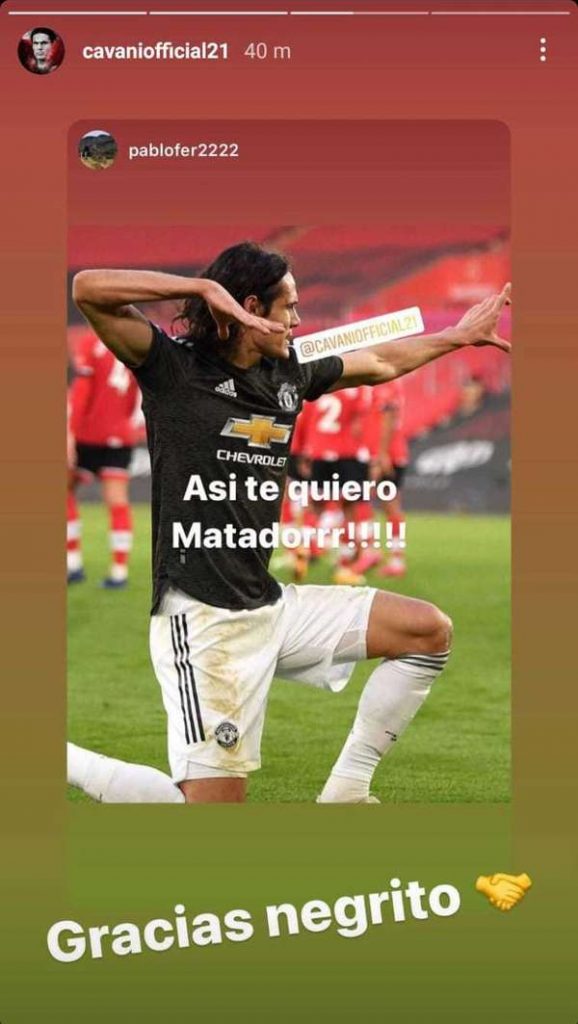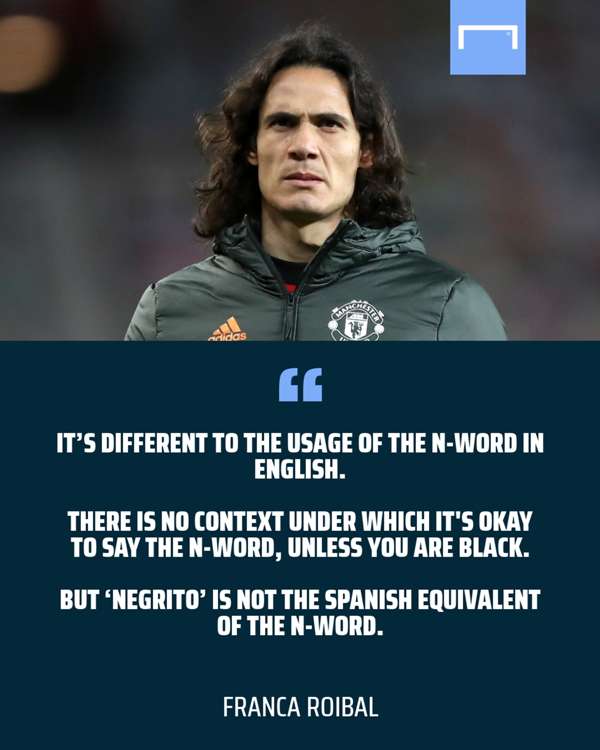


WARNING: This article contains language referring to race that, while deconstructed and contextualised, some readers may find offensive
At first glance of the Spanish word, its meaning seems unmistakeable. “Negrito.”
The word is discriminatory and racist, a demeaning slur directed to Black people and one that should be wholly condemned and erased from modern vernacular, the Spanish-language translation of the repugnant n-word in English.
But what if it isn’t?
When Edinson Cavani responded to a congratulatory post from a friend on his Instagram after scoring a brace for Manchester United against Southampton with the caption “gracias negrito”, the English-speaking football world erupted in anger.

The Uruguay international was immediately met with criticism on social media as the post was seen as overwhelmingly offensive. He was accused of using racist language and has since been charged with misconduct by the FA, potentially leading to a ban and/or a fine.
Cavani deleted the post shortly afterwards once he was aware of how the term could be construed in the UK and apologised. He has since been subject to an investigation from the FA that could result in a three-match ban.
Cavani’s defence is he was using the word innocently. In South America, the term “negrito” – the literal translation being “little black man” – is considered inoffensive and innocuous, and used commonly as a term of endearment and affection.
It is also used to describe someone with dark hair, not just dark skin, as well as a synonym for “mate”.
And in this instance, nuance – as well as context – and the differing of cultures is crucial to understand.
“The way that he said it to his friend was definitely a term of endearment. My grandmother calls me that,” explains Franca Roibal, a professor of Spanish with a PhD from Boston University.
“We’ve got this binary of what is and isn’t racist, as well as a lack of understanding of those levels. When it’s Cavani, who is a Latino man who doesn’t speak English, there’s this level of what he did was so unforgivable.
“The other thing that we have to understand is that in Spanish, the word ‘black’ literally is ‘negro’. That’s just the name of the colour. When things are black – like an object – you say ‘negro’.
“A lot of Afro-Uruguayans and Afro-Latinos prefer to be called ‘negro’. Just like how Black folks in the United States prefer to be called Black rather than African-American.

“It’s different to the usage of the n-word in English. There is no context under which it’s okay to say the n-word, unless you are Black. Black people can say it – that’s their word. Nobody else can.
“But ‘negrito’ is not the Spanish equivalent of the n-word.”
Unfortunately for Cavani, cultural contexts of certain phrases are lost once you leave the familiarity of your native country.
And it’s not the first time that English football has reckoned with the word.
The controversy surrounding Cavani is reminiscent of the incident involving former Liverpool striker and fellow Uruguayan Luis Suarez in 2011, when he called Patrice Evra – who was playing for Man Utd at the time and is Black – by the word “negro”.
“Negrito” is a diminutive form of “negro”. As Roibal explains, its literal translation is “black” in Spanish.
Suarez was immediately branded as a racist by the English media and fans, and was handed an eight-match ban along with a £40,000 ban. Despite Suarez, like Cavani, insisting that he was only saying the word in an amiable way, his usage of the word was deemed racist and he was punished accordingly.
In this case, it’s not only context that matters – intent and impact does, too.
“Cavani is not racist, at least in this incident specifically,” says Roibal. “The Suarez case, however, is different as he said the word in contempt during a heated situation between two opposition players. It came out of his mouth, and he said it on the pitch.
“Cavani, meanwhile, said it in a post to his friend who he’s called ‘negrito’ his whole entire life. Maybe he forgot that his platform was so public, or he thought he was DM-ing someone, or who knows, but he immediately deleted the post. He immediately apologised.”
But even acknowledging the fact that “negrito” is meant to be used in a cordial and non-racist manner, it doesn’t take away from the fact that it is a term used to specifically describe a person’s physical appearance – in particular that of a Black person.
Even if the word is part of the Spanish lexicon in South America, it is still a prejudiced term to use. In fact, the common usage of the word has normalised this sort of thinking.

As a result of post-colonial Uruguay and the prominence of the slave trade in Montevideo, Afro-Uruguayans in particular have continued to suffer from systemic oppression and discrimination within the country. They account for up to 12 per cent of the country’s population and make up some of the poorest sectors of society.
Based on information taken from Uruguay’s 2011 census, 50% of Afro-Uruguayans live below the poverty line. The same percentage also never finished high school, and just 7% have university degrees. And, as a result of the low number of educated Afro-Uruguayans, they have an unemployment rate of 14%.
In 2013, Uruguayan side Danubio were fined after their fans had sung “the black guy sucks d***” at River Plate’s goalkeeper. In 2018, Uruguayan goalkeeper Lucero Alvarez was suspended for eight matches in Colombia for making allegedly racist comments against Huber Bodhert.
The racism transcends not just football, but the rest of society. Black and brown Uruguayans continue to be marginalised and, due to the history of slavery within the country, have gone on to still accept the negative stereotypes of the past.
For Roibal, the issue is not to attack Cavani for his use of the word – but to direct our attention at the very existence of the word at all.
“It’s tough because so many will say, ‘Oh, it’s a term of endearment’ and we just need to accept it as is,” says Roibal. “But that’s not true, either. It isn’t right.
“We have to attack the systemic racism that allows for this word to continue to be said, whether it’s a term of endearment or not. The diminutive nature [of negrito] does make it a term of endearment. Is that a problem? Yes. Is that Cavani’s fault? No.”
Instead of being so quick to vilify Cavani and other footballers who might use a word insensitively, the anger and furore needs to be directed at the society that enables such prejudiced thinking, and not the individual.
“Now I am defending Cavani and saying that I don’t believe he is racist, based on the use of this term,” says Roibal. “And I am not defending systemic racism that allows for this to continue.
“But people that defend the context will say that it’s still okay to say. So we do need to look at that system that allows for these words to be said at all.
“Black folks in Uruguay will tell you, no, I’m not offended by that term. But is that part of internalised racism? Sure. Do we believe them? Yes.
“As non-Black people, even if we are minorities, we can’t take on that role of white saviour and criticise them for not being offended by the term. That’s patronising. So you have listen to the communities. But we also need to attack these ideas from a systemic point of view.
“The fact that it’s considered a term of endearment at all is the problem.”
Additionally, the context of the word in relation to the Afro-Latinx community is extremely important.
While Cavani is considered a white-passing South American, it is thought that his usage of “negrito” is less acceptable when his light-skinned nature is taken account – but in Uruguay, the fact that everyone is allowed to say the word is still considered a problematic issue.
“This [Cavani incident] is an example of racial insensitivity, at least,” she continues. “We can’t just simply go to the place of just fervently defending it. We need to address the fact that the term is problematic.
“People will just excuse it as being part of the language, but that’s wrong. We evolve with the language. It doesn’t mean that we’re attacking you, or your heritage, or your history.
“We should be looking at ourselves as a society and asking ourselves: ‘What do we do to battle systemic racism in Uruguay? Is it enough? Can we be doing more?’ And that’s the conversation that’s not happening either.”
For Uruguayan footballers like Cavani and Suarez, it may not matter that they’ve understood “negrito” to be a term of affection. The next step is to help them understand just why it isn’t acceptable to say such a word in the UK.
Football clubs must do the work to inform and educate their foreign players about the intricacies of language as we know it. Education about differing cultures and social norms has the ability to have more of a lasting impact than bans or fines.
“It’s a scapegoat punishment,” Roibal says of Cavani’s potential three-match ban from the FA. “The club gets nothing out of it. It wasn’t said on the pitch, and it wasn’t set as an insult. I don’t think he should get a three-match ban.”
source:- goal

SPONSORED LINKS
[TRENDING SONG!!] Romani D-Fans – Bestie (Prod By Krizbeatz)
[TRENDING MIXTAPE!!] DJ Baddo – Bestie Unlimited Mix
[TRENDING SONG!!] TYSG Ft Bad Mz X Kendi Rozzi – Iyariya
INSTALL 9JAFLAVER MUSIC APP, STREAM, DOWNLOAD, AND PLAY MUSIC OFFLINE
CHECK OUT FUNNY PICTURE AND MEME HERE (CLICK HERE)
Chissom Anthony – Glory To God In The Highest [See Trending Gospel Song]
© 2014-2023 9jaflaver. All Rights Reserved.
About us | DMCA | Privacy Policy | Contact us
| Advertise| Request For Music | Terms Of Service
9jaflaver is not responsible for the content of external sites.